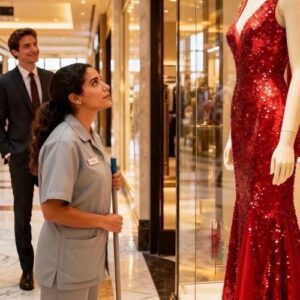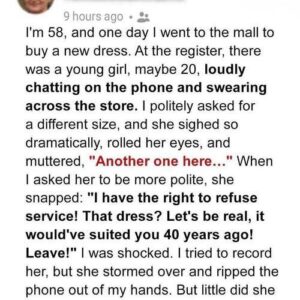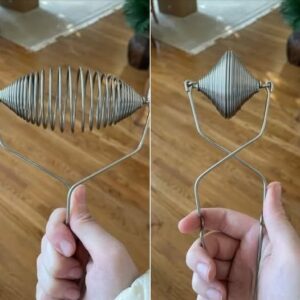The late-summer heat pressed against the park like a warm hand, heavy and persistent, the kind of heat that made tempers short and patience thin. Joggers moved slowly, dog walkers lingered in patches of shade, and the scent of cut grass drifted lazily through the air. It was the kind of day when the world moved just a little sluggishly, and no one really wanted to engage with anyone else. Everyone was too wrapped in their own discomfort. Everyone except him.
He sat on the same bench he always did—third one from the fountain, facing the jogging path. His posture was bent, shoulders curled slightly inward, a posture that spoke of years spent carrying memories heavier than his own frame. His hands rested on a wooden cane polished from habit, each movement careful and deliberate. And although his eyes were tired, they still carried the flicker of someone who hadn’t fully surrendered to time. He watched the world with a level of attention most people missed. And today, the world watched him back—or at least, one person did.
She saw him before he saw her. Or rather, she felt him. That prickling sensation at the back of her neck, that awareness women learn too young and never quite unlearn. She had been jogging—earbuds in, ponytail swinging, breath steady—when she sensed it. Eyes on her. Not the casual glance of someone people-watching, but something that made her pace slow, then stop entirely.
He was staring.
Or at least it looked that way from where she stood.
His expression was soft, faintly smiling, a small upturn at the corners of his mouth that contrasted sharply with the fury rising in her chest. She yanked out her earbuds and stared back. He didn’t look away. Not immediately. And that was enough.
In a world where women are told to be careful, to be alert, to never ignore a gut feeling, she had learned to trust her instincts. She’d had men leer at her before. She’d had worse. This felt like another moment to stand her ground rather than shrink from it. Heat rushed up her throat, and her pulse quickened—not out of fear, but out of anger knotted tight with exhaustion.
She marched toward him.
The old man looked up slowly, almost confused by the sudden determination in her stride. She stopped in front of him, arms crossed over her chest, chin lifted in defense. Her voice, when she spoke, was sharp enough to cut the thick air between them.
“Do you always stare at women like that?”
People passing by slowed down. Some pretended not to listen while straining their ears anyway. The park, once quiet, seemed to hold its breath.
The old man blinked. Once. Twice. Then he offered a small, tired smile—not mocking, not sly, not ashamed. Just… human.
“I’m sorry,” he said softly. “I didn’t realize I was staring.”
She scoffed, shifting her weight as frustration bubbled hotter. “You were. I saw you.”
He nodded gently. “Yes. I suppose I was.”
His honesty disarmed her for a moment. She expected denial, defensiveness, or deflection. Not this quiet acceptance. A part of her wanted to walk away right then, to drop the confrontation and leave, but another part—the part still burning—waited for an explanation.
“Why?” she demanded. “Why were you staring?”
He looked down at his hands, then back up at her with eyes that held something she hadn’t expected: sadness. Deep, aching sadness.
“I’m eighty-two years old,” he said. “My joints hurt. My back hurts. My memories hurt. Most days I come here because it’s the one place where the world feels… alive.”
She didn’t move. She didn’t respond. She just listened, the tension in her shoulders loosening by an inch.
“I wasn’t staring at you because you’re a woman,” he continued quietly. “I was watching you because you run like someone who still believes in tomorrow.”
The words hit her in a way she wasn’t prepared for.
“You run like someone who hasn’t given up,” he added. “Someone young. Strong. Someone who still has the world rushing toward her instead of behind her.”
Her mouth opened, then closed. Her anger faltered, wobbling under the unexpected weight of his confession.
His voice broke a little as he finished, “Seeing you reminds me that there are still reasons to keep waking up. That hope still exists in people who haven’t lived long enough to forget it.”
Silence washed over the park.
She had come toward him armed with assumptions sharpened by experience. Assumptions she had every right to have in a world that often punished women for trusting their instincts too late. But now, confronted not with malice but with vulnerability, her armor cracked. The old man wasn’t a creep. He wasn’t a threat. He wasn’t even really looking at her—he was looking toward his own fading reflection in her youth.
Her voice softened without her meaning it to. “I… didn’t know.”
He nodded kindly. “Of course you didn’t. And you were right to ask. The world hasn’t always been kind to you, I imagine.”
She swallowed hard. “No. It hasn’t.”
“I’m sorry for that,” he said, eyes sincere. “Truly.”
For a moment, neither of them moved. The summer heat pressed around them, but something else—something gentler—settled in the space between them.
She thought of all the warnings she’d grown up with, all the fear stitched into her bones, all the times she’d clenched her keys between her fingers walking home at night. And she thought of him—this fragile man with trembling hands and a smile that wasn’t hunger but gratitude.
Something tender pushed its way through her chest.
Before she could overthink it, she leaned down and pressed a light kiss to his cheek. His breath caught. His eyes shone with surprise and something that looked dangerously close to tears.
“Have a good day,” she whispered.
Then she jogged away, her stride different now—softer, freer, as though the world had shifted half an inch to the right. Behind her, the old man touched the spot on his cheek where her lips had brushed, disbelief warming his expression.
A couple sitting on a nearby bench smiled. A teenage boy lowered his phone, suddenly thoughtful. A mother pushing a stroller wiped her eyes. A small moment—a misunderstanding turned connection—had rippled outward like sunlight breaking through thick clouds.
Later that night, as she lay in bed, she replayed the encounter. She realized that both of them had stepped into an uncomfortable space—she with her fear and frustration, he with his loneliness and truth—and somehow met in the middle. And in doing so, both had been changed, if only a little.
She understood now that not every gaze is dangerous, and he understood that not every confrontation is an attack. Sometimes, life places people in front of us not as enemies or threats, but as mirrors—reflecting who we are, what we fear, what we long for.
In the end, the moment wasn’t about a young woman and an old man. It was about two human beings crossing paths at the exact second they each needed to be seen.
And maybe that was the real joke of life—not the kind that makes you laugh until you cry, but the kind that makes you cry until you understand.





